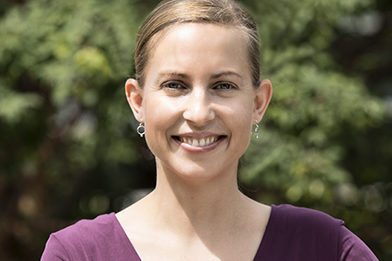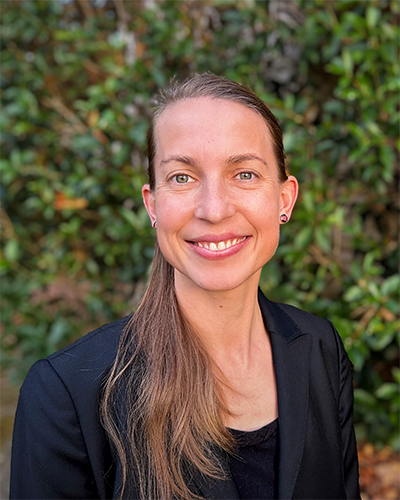
 INTERVIEW: We sat down with the GES Center’s newest Senior Research Scholar and faculty affiliate, Khara Grieger. She joined our team in the spring of 2019, but has already given a colloquium and is working on several nanotechnology-related research projects.
INTERVIEW: We sat down with the GES Center’s newest Senior Research Scholar and faculty affiliate, Khara Grieger. She joined our team in the spring of 2019, but has already given a colloquium and is working on several nanotechnology-related research projects.
Hi Khara, thanks for taking the time to chat with us. To start, tell us a bit about your background?
Thanks! Well, currently, I’m working on a range of projects related to responsible innovation of emerging issues and novel technologies, including engineered nanomaterials, societal implications, and policy. I am a Co-PI on a collaborative research project between NC State and RTI International focused on sustainable development of nanomaterials used in water treatment technologies, and am leading efforts to investigate potential risks and inform nanomaterial innovation. I am also an advisory board member for a large European project focused on nanomaterial risk governance. Starting this summer, Jennifer Kuzma (GES Co-Director) and I are leading a USDA/NIFA-funded grant to investigate the societal implications of nanomaterials in the farm to fork continuum.
Before joining the team at NC State, I was a Senior Environmental Research Scientist at RTI International in the Health and Environmental Risk Analysis program (2012-2019) and a Duke University Scholar (2017-2018). In addition to conducting and leading independent research projects, I’ve also managed and provided technical support for numerous federal projects, including those funded by US-FDA, EPA, NIOSH, and Army.
For my education, I completed a Ph.D. and Postdoc at the Technical University of Denmark in Environmental Engineering. Prior to that, I received an MSc from DTU in Environmental Engineering, an MS in Plant Biology and Ecology, and a BS in Zoology from Michigan State University.
What brought you to the GES Center?
I came to GES recently since I have been really impressed by the research and collaborative team environments here. In addition, my research interests seem to align well within the science-in-society and transdisciplinary nature of work conducted in GES.
We’re thrilled to have you here! What kinds of projects will you be working on, and what are you hoping to accomplish?
In addition to the projects I described above, my goal is to continue to work on interesting projects that involve complex intersections between emerging technologies, risk, uncertainty, decisions, regulations, and ethics. In the near-term, I will be pursuing numerous proposals and project initiatives within this space and will continue to interact with folks across NC State as well as continue my interactions with external colleagues, including those in international institutions.
Why is this work important to you? What inspires you?
It is becoming increasingly clear that the rate of technological innovation is far surpassing our ability to understand their potential impacts and implications. I’m very passionate about deriving strategies and best practices to better understand potential impacts on health, the environment, and society of emerging technologies, particularly technologies that may have the capacity to revolutionize and transform society. In these processes, it’s critical that numerous stakeholder perspectives are considered in order to develop and implement robust decision-making and (risk) governance processes to ensure responsible innovation.
Tell us about an accomplishment that you’re proud of.
While I am proud of many of my accomplishments (including a recent Collaborative Research Award by the Research Triangle Nanotechnology Network (2018) and HOT article designation in Environmental Science: Nano (2018), I am actually more proud of taking ownership of my professional success at different points of my life. My first big leap came in 2003 when I moved to Copenhagen Denmark on my own, carrying 2 suitcases, a 3-month tourist visa, and knowing a handful of people there. Eventually, I found my way to DTU and was accepted into their international MS program in Environmental Engineering, which was free to foreigners at that time. Those years were not easy, as I walked dogs, tutored English, and cleaned houses to make enough money to live there (on a student visa), but I managed to come back to the US with an MSc and Ph.D. in Environmental Engineering in addition to an international network of family and colleagues. My second big leap came in 2012 when my husband and I decided to move back to the US and start a family. Growing your profession while raising small children is no small feat, especially when re-establishing your connections and networks. It took a while to get reacclimated to American culture, and I am probably still adjusting. Now, I believe I am in my third big leap in my professional career. Serving as a Duke University Scholar for a year (2018) confirmed that I will be able to better pursue my research passions at an academic institution, and GES was really interesting for me given the transdisciplinary nature of the work conducted here. I’m really excited and looking forward to connecting with more GES staff in the coming weeks and months!
I should also mention that I am proud to serve on the Town of Cary’s Environmental Advisory board (2018-2021). It has been fascinating to interact with local government officials on diverse strategies to improve sustainability in our community, especially since much of my research has either been at national or international levels. It is always empowering to work alongside a group of dedicated, passionate individuals for a common cause.
What’s your superpower? What are the best skills that you bring to your work?
I have been told multiple times recently that I am efficient, goal-oriented, and “can get things done.” I also try and “be the change you want to see in the world” in terms of one’s own balance and being respectful towards all individuals regardless of their title, rank, or status.
Do you have a personal motto?
After becoming a mother, I found myself self-coaching a lot through words of affirmation. I often think “You’re stronger than you think you are,” which has seemed to come in handy in times of fear or doubt. Also, I often think about this piece of advice from a former supervisor—“Take control over your life and your career, or else someone will do it for you.”
Related links:
- 2/26/19 GES Colloquium: Governance Strategies for Emerging Risks of Solar Radiation [Video]
- Publication: Risk Governance of Nanomaterials: Review of Criteria and Tools for Risk Communication, Evaluation, and Mitigation (Nanomaterials, 2019)
- Publication: Emerging risk governance for stratospheric aerosol injection as a climate management technology (Environment Systems and Decisions, 2019)
- Game-Changing Research Incentive Program (GRIP) Award: Water Sustainability through Nanotechnology: Nanoscale Science and Engineering at the Solid-Water Interface
- Khara Grieger CV